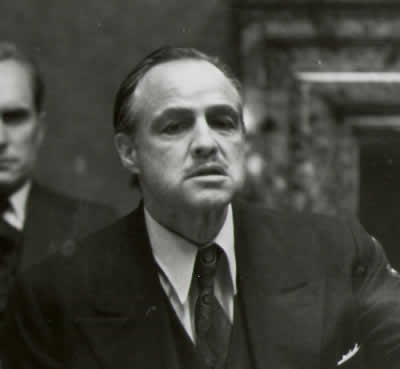Hollywood Hype
 Still reeling from the social upheaval of the 1960s, weary Americans found comfort in a very strange role model: fictional gang boss Don Vito Corleone in "The Godfather" (1972), featuring Marlon Brando's Oscar winning performance. The film version of Mario Puzo's pulp novel became the highest-grossing American film ever made and also won an Oscar for Best Picture. It continues to routinely top critics' lists of all-time classics. Still reeling from the social upheaval of the 1960s, weary Americans found comfort in a very strange role model: fictional gang boss Don Vito Corleone in "The Godfather" (1972), featuring Marlon Brando's Oscar winning performance. The film version of Mario Puzo's pulp novel became the highest-grossing American film ever made and also won an Oscar for Best Picture. It continues to routinely top critics' lists of all-time classics.
Joe Truth
Coming 40 years after "Little Caesar" (1931), Francis Ford Coppola's lush, romantic
treatment of the Corleone saga institutionalized Italian mob stereotypes, making
them a respectable part of Americana. Interestingly, author Mario Puzo came clean
just before his death in 1999: "Italian crooks never referred to each other as
godfather. Never. It was a term that I made up. I wanted to create a romantic
myth, like the cowboy."
Despite spawning an entire industry of mob movies since its release, "The Godfather" is not universally loved. High profile Italian Americans from singer Tony Bennett to former New York governor Mario Cuomo have publicly criticized the film for its blatant--and false--linking of criminality with Italian culture. Cuomo, in particular, has stated that the film, however well done, is a slap-in-the-face to the millions of honest, hard-working Italians whose sweat, blood and sacrifice made America great. "The Godfather" distorts the immigrant experience
In a final irony, Marlon Brando used his Oscar win as a platform to publicly deplore the plight of Native Americans--yet he stereotyped Italian Americans in order to do so.
|


